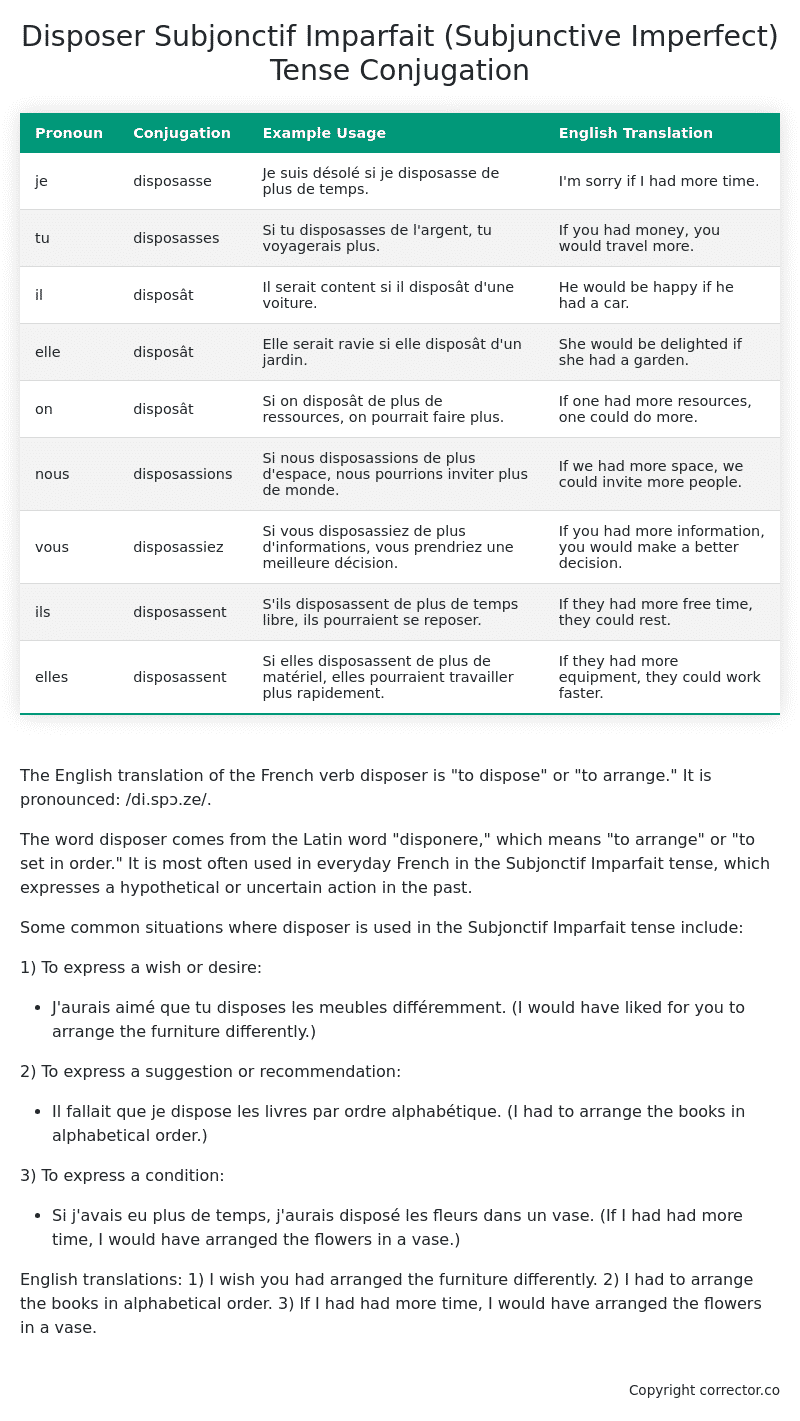Subjonctif Imparfait (Subjunctive Imperfect) Tense Conjugation of the French Verb disposer
Introduction to the verb disposer
The English translation of the French verb disposer is “to dispose” or “to arrange.” It is pronounced: /di.spɔ.ze/.
The word disposer comes from the Latin word “disponere,” which means “to arrange” or “to set in order.” It is most often used in everyday French in the Subjonctif Imparfait tense, which expresses a hypothetical or uncertain action in the past.
Some common situations where disposer is used in the Subjonctif Imparfait tense include:
1) To express a wish or desire:
- J’aurais aimé que tu disposes les meubles différemment. (I would have liked for you to arrange the furniture differently.)
2) To express a suggestion or recommendation:
- Il fallait que je dispose les livres par ordre alphabétique. (I had to arrange the books in alphabetical order.)
3) To express a condition:
- Si j’avais eu plus de temps, j’aurais disposé les fleurs dans un vase. (If I had had more time, I would have arranged the flowers in a vase.)
English translations:
1) I wish you had arranged the furniture differently.
2) I had to arrange the books in alphabetical order.
3) If I had had more time, I would have arranged the flowers in a vase.
Table of the Subjonctif Imparfait (Subjunctive Imperfect) Tense Conjugation of disposer
| Pronoun | Conjugation | Example Usage | English Translation |
|---|---|---|---|
| je | disposasse | Je suis désolé si je disposasse de plus de temps. | I’m sorry if I had more time. |
| tu | disposasses | Si tu disposasses de l’argent, tu voyagerais plus. | If you had money, you would travel more. |
| il | disposât | Il serait content si il disposât d’une voiture. | He would be happy if he had a car. |
| elle | disposât | Elle serait ravie si elle disposât d’un jardin. | She would be delighted if she had a garden. |
| on | disposât | Si on disposât de plus de ressources, on pourrait faire plus. | If one had more resources, one could do more. |
| nous | disposassions | Si nous disposassions de plus d’espace, nous pourrions inviter plus de monde. | If we had more space, we could invite more people. |
| vous | disposassiez | Si vous disposassiez de plus d’informations, vous prendriez une meilleure décision. | If you had more information, you would make a better decision. |
| ils | disposassent | S’ils disposassent de plus de temps libre, ils pourraient se reposer. | If they had more free time, they could rest. |
| elles | disposassent | Si elles disposassent de plus de matériel, elles pourraient travailler plus rapidement. | If they had more equipment, they could work faster. |
Other Conjugations for Disposer.
Le Present (Present Tense) Conjugation of the French Verb disposer
Imparfait (Imperfect) Tense Conjugation of the French Verb disposer
Passé Simple (Simple Past) Tense Conjugation of the French Verb disposer
Passé Composé (Present Perfect) Tense Conjugation of the French Verb disposer
Futur Simple (Simple Future) Tense Conjugation of the French Verb disposer
Futur Proche (Near Future) Tense Conjugation of the French Verb disposer
Plus-que-parfait (Pluperfect) Tense Conjugation of the French Verb disposer
Passé Antérieur (Past Anterior) Tense Conjugation of the French Verb disposer
Futur Antérieur (Future Anterior) Tense Conjugation of the French Verb disposer
Subjonctif Présent (Subjunctive Present) Tense Conjugation of the French Verb disposer
Subjonctif Passé (Subjunctive Past) Tense Conjugation of the French Verb disposer
Subjonctif Imparfait (Subjunctive Imperfect) Tense Conjugation of the French Verb disposer (this article)
Subjonctif Plus-que-parfait (Subjunctive Pluperfect) Tense Conjugation of the French Verb disposer
Conditionnel Présent (Conditional Present) Tense Conjugation of the French Verb disposer
Conditionnel Passé (Conditional Past) Tense Conjugation of the French Verb disposer
L’impératif Présent (Imperative Present) Tense Conjugation of the French Verb disposer
L’infinitif Présent (Infinitive Present) Tense Conjugation of the French Verb disposer
Struggling with French verbs or the language in general? Why not use our free French Grammar Checker – no registration required!
Get a FREE Download Study Sheet of this Conjugation 🔥
Simply right click the image below, click “save image” and get your free reference for the disposer Subjonctif Imparfait tense conjugation!

Disposer – About the French Subjonctif Imparfait (Subjunctive Imperfect) Tense
Formation
Common Everyday Usage Patterns
Interactions with Other Tenses
Subjonctif Présent
Indicatif Passé Composé
Conditional
Conditional Perfect
Summary
I hope you enjoyed this article on the verb disposer. Still in a learning mood? Check out another TOTALLY random French verb conjugation!


